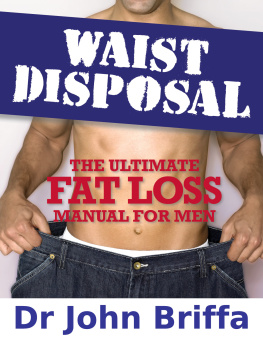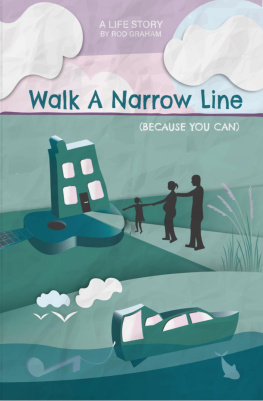Praise for At the Narrow Waist of the World
Reminiscent of Sandra Cisneros The House on Mango Street with its lyrical voice and tender narrator, At the Narrow Waist of the World is a gorgeously vivid memoir that blends the Spanish of the authors native home and the English of her adopted country to describe the weight of events and a larger-than-life mother who confounds family and psychiatrists alike. The book pulses like a constellation in the night sky.
Jimin Han, author of A Small Revolution
In this lyrical chronicle about a girl growing up Jewish in Panama, we learn from Marlena Baraf that it is possible to live on that narrow edge between countries, languages, and spiritual homes.
Ruth Behar, author of Lucky Broken Girl and An Island Called Home: Returning to Jewish Cuba
Marlena Maduro Barafs compelling memoir, At the Narrow Waist of the World, transports us into her Panamanian childhood in the 1950s and 1960s, when her enchanting mother succumbs to mental illness and is sent away for years at a time. Barafs writing is lush, immersing us in the scent of hot days and bougainvillea, the sounds of childrens games and family feasts, and the colorful, beautiful dresses of her mother and aunts. The books dance between Spanish and English fills it with a musical beauty, revealing the love and support of this remarkable family.
Elizabeth Garber, author of Implosion: A Memoir of an Architects Daughter
No fanfare, no pyrotechnics. Life-changing decisions explained in humble, passionate ways. Simple words for simple actions. A lesson in literary moderation.
Ilan Stavans, author of On Borrowed Words
A charming and heartfelt mosaic of stories that paint a portrait of a girl and her troubled mother and the loving family that nurtures them both. Marlena Barafs is a wise and authentic voice, distinctive and poetic.
Sally Koslow, author of Another Side of Paradise
I was totally absorbed and deeply moved by this lyrical memoir, which introduces the reader to the sounds and colors of Panama and the bonds linking a Sephardic family in the face of illness and tragedy. The author delicately recreates her struggles as a child and adolescent to come to terms with the mental illness of her mother. We alternately celebrate and grieve with her, and catch glimpses of the strength of an extended Sephardic family in a society where they are deeply rooted. Marlena Barafs journey from Panama to New Yorkfrom girlhood to adulthoodis a universal human story.
Jane S. Gerber, Professor Emerita of History, Graduate School of the City University of New York, and author of The Jews of Spain and The Jews of the Caribbean

AT the NARROW WAIST of the WORLD

Copyright 2019 by Marlena Baraf
All rights reserved. No part of this publication may be reproduced, distributed, or transmitted in any form or by any means, including photocopying, recording, digital scanning, or other electronic or mechanical methods, without the prior written permission of the publisher, except in the case of brief quotations embodied in critical reviews and certain other noncommercial uses permitted by copyright law. For permission requests, please address She Writes Press.
Published August 2019
Printed in the United States of America
Print ISBN: 978-1-63152-588-9
E-ISBN: 978-1-63152-589-6
Library of Congress Control Number: 2019935694
For information, address:
She Writes Press
1569 Solano Ave #546
Berkeley, CA 94707
She Writes Press is a division of SparkPoint Studio, LLC.
The author is grateful to the following literary journals where parts of this memoir were first published as essays. Mami was published in The Westchester Review; La Misa, in Blue Lyra Review; Days of Opera, in Lumina; Sweet Tarts, in Streetlight Magazine.
This story is true as it happened to me. But it also belongs to other individuals in my family and to the collective family that in Latin America embraces a much larger group. We are tightly woven in the cloth. Others recollections and tender memories will be different from mine. This is the nature of life. Here is my truth at this moment in time.
Most names have remained the same. A few have been changed to preserve the privacy of certain individuals.
Para Patricia, Carlos, y Roberto
CONTENTS
A NOTE TO READERS
When I began to write this story, I found that it became impossible to strip it of my language of birth. Spanish expressions came loaded with meanings dragging behindcans tied to the back of cars of newly wed couples, strings of story and culture. The tale would be untrue. Clearly at a colossal distance from experiences that took place in a Spanish-speaking world.
Tone of voice, a phrase, a snapshot in my mindthis is how my memories began, fragments remembered and raw feelings leading me to a predestined accounting. My mothermamihad an undiagnosed mental illness. She was taken to psychiatric hospitals when I was a girl and young woman. Here is the story of loving herand holding her at a distance, a self-protective reflex that set me on a PanamaUnited States journey and changed the center of my world.
Lleg el aguacero, the calls announcing the arrival of pounding rain, are roped to the image of maids in white, horquillasclothespinsbetween their teeth, fingers pulling towels from clotheslines, my excitement at the rumbling cascade of thunder.
My mother said, Me quieren matar, the maids want to kill me. That scoundrel, poison! She said matar, accent on the second syllable, more fluid and prolonged than kill, which can happen with a single bullet. Estn gordas, she told us. Not, You are fat. Gordas is fuller, richer in meaning, linked to Colombian artist Boteros corpulent figures more than to the derisive and simplified, fat. And a teta is not a breast, not even a tit.
Juda, with the harsh jota sound, meaning Jew, arrived chained to ancient epithets, loathing, and fears, though my Sephardic Jewish family was generally treated with delicacy in a country of easygoing people who lived in a steaming heat that was almost impossible to escape.
Expressions that individuals in my family used brought the person and issues to life. Con quin andas? Whom do you walk with? Who are your friends? is linked evermore with my grandmother, Amam, who worried that we wouldnt be accepted in Catholic society. Qu me est pasando? was a recurring refrain from mami as she poked at her throat, or her chest, or her lungs. What is happening to me?
Toys that I went to to Felixs store to select are not the same as the juguetes we played with. The extra syllables in the Spanish word juguetes extend the pleasure of my patines and muecas. Ill pay you back, te lo prometo, my brother Carlitos said, te lo prometo. The English, I promise, does not ring as true. In Spanish, Carlitos used the intimate, I promise it to you.
The words chose me, the ones that expressed a fuller meaning or played a better tune with English, the flexible language of my more recent acquaintance. I have provided translations in most cases so that non-Spanish speakers are not left behind, but Ive left some Spanish expressions untouched, as they are part of the fabric of my youth.










